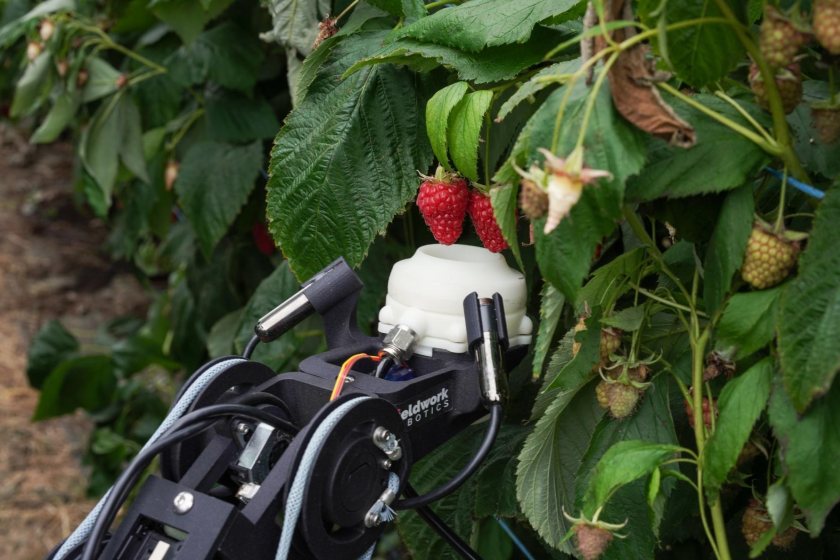Firm makes significant progress with raspberry harvesting robots

An agri-tech company has made significant strides in its work to develop a range of fruit harvesting robots to support the agriculture sector.
The raspberry picking robots developed by Fieldwork Robotics have now been deployed commercially in two locations in Portugal.
The robots – fitted with four picking arms – are successfully working autonomously, with its sensor technology and grippers having been completely redesigned to reduce slippage and cut the harvesting time.
As a result, the fruit being picked has passed all quality controls, with the company now working to further speed the picking process so that each robot can gather 2kg of fruit per hour.
It is also making progress in its efforts to drive down production costs, with changes in the materials used for the robots expected to cut costs by more than 20%.
Fieldwork Robotics was launched in 2016 to develop and commercialise the work of Lecturer in Robotics Dr Martin Stoelen, and the company is now based in Cambridge.
Its aim has always been to create autonomous robots that can work alongside the human workforce and ensure any gaps in productivity are filled.
It has currently developed two systems – a vertical harvester that can be adjusted depending on the height of fruit plants, and a horizontal platform that can navigate in multiple farming environments and be deployed through rows of crops for picking without human supervision.
The advances in technology and commercial activity recently saw the company receive the New to Market Award in the UK-Portugal Department for International Trade Business Awards.
Rui Andres, Director and CEO of Fieldwork Robotics, said: “The UK alone is facing a shortage of around 90,000 harvesters, and that has the potential to impact on food availability.
"Our purpose has always been to help growers harvest everything they produce, keeping waste to an absolute minimum and ensuring they can operate in a sustainable manner.
“Through our technological advances and commercial deployments, we are making real progress in the development of our harvesting robots.
"Raspberries are very sensitive so we have had the develop technology that can apply enough pressure to release the fruit from the stem without damaging it.
"At the same time, our sensors are now so advanced that they can tell if the fruit is ready to be harvested or not, meaning what can be sold is all that is picked.”
Since its launch, Fieldwork has raised significant funds through external investment and equity fundraising, overseen by the university’s commercialisation partner Frontier IP.
This has included raising £675,000 through an equity fundraising from existing and new investors in March 2021, and receiving more than £850,000 from Innovate UK to accelerate scale up of its raspberry harvesting robot to bring it to market.
It has developed close partnerships with some of the world’s leading fruit and vegetable producers, including Bonduelle and the Hall Hunter Partnership, while also working to optimise its technology in conjunction with engineers at Bosch.
In addition to raspberries, its robots can also be adapted for different crops by changing the software algorithms and tools at the end of the harvesting arms.
How does the raspberry harvester work?
Raspberries are a very tough product to work with as the right pressure is required to release each berry without bruising it.
To overcome that, the technology developed by Fieldwork Robotics uses a combination of 3D cameras, sensors and machine learning to identify if a fruit is ripe enough to be picked.
The robot’s four picking arms then move towards the fruit and apply pressure to the stem of each fruit, rather than the berry itself.
This ensures the raspberries are not damaged, and tests have shown the quality of picked fruit is the same as that collected by human workers.
The long-term aim is that each robot will be capable of picking more than 25,000 raspberries over the course of a day, but it can keep working for as long as its batteries retain power.
By contrast, human workers pick around 15,000 in a typical eight-hour shift.








